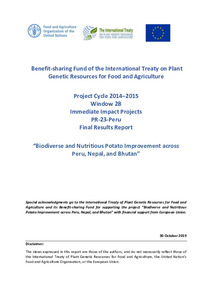The Biodiverse and Nutritious Potato Improvement across Peru, Nepal, and Bhutan project addressed climate change, food security, nutrition, and the sustainable use of biodiversity in vulnerable mountainous regions. Potato is a major staple across the Peruvian Andes and the high Himalayas-Hindu Kush regions of Nepal and Bhutan. There, climate change has the potential to increase temperatures and evapotranspiration rates, accelerate glacial melting, and diminish water resources. Extreme weather events and shifts in pest and disease pressure are anticipated to negatively affect crop production and food security. To face these harsh and changing conditions, farmers need to be equipped with adapted varieties and the knowledge and capacity to grow them. More than half of the highland population of children in Nepal, Bhutan, and Peru suffer from iron (Fe) deficiency, so there is also the need for more nutritious staple crop varieties in these areas. This highlights the importance of biofortification as a viable food-based strategy for reducing malnutrition levels of affected populations.
Biodiverse and nutritious potato improvement across Peru, Nepal, and Bhutan. Final results report.
Citation: International Potato Center. 2019. Biodiverse and nutritious potato improvement across Peru, Nepal, and Bhutan. Final results report. 46 p. Lima (Peru). International Potato Center. 46 p.
2020-01-22
BIODIVERSITY FOR THE FUTURE, GENETICS, GENOMICS AND CROP IMPROVEMENT SCIENCES GGCI, NUTRITION, POTATO AGRI-FOOD SYSTEMS, POTATOES
Asia, Latin America, South America
Bhutan, Nepal, Peru
report

